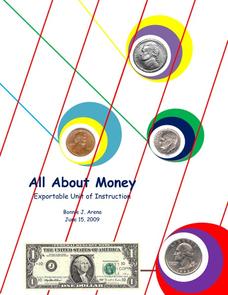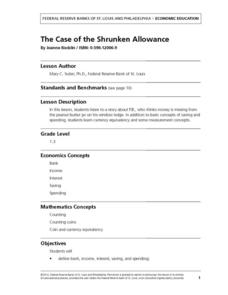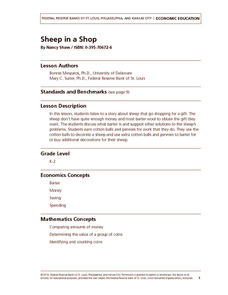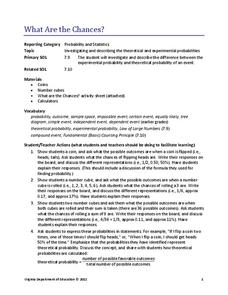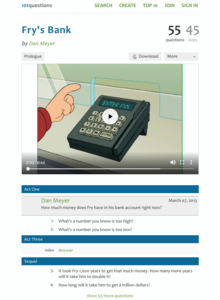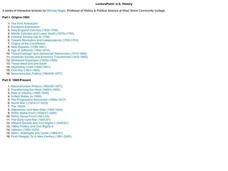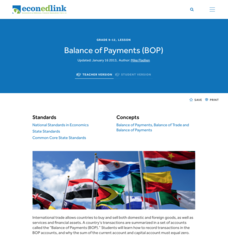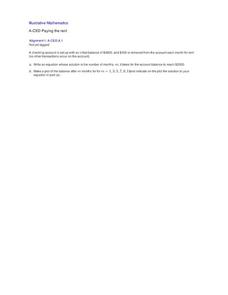Curated OER
All About Money
Few topics engage young mathematicians as much as learning about money. Through a series of shared readings and hands-on activities, children explore the US currency system, learning how to count money and calculate change as they create...
Scholastic
Study Jams! Compare Money Amounts
Elementary money makers are walked through five steps to compare two different amounts. RJ speaks slowly as animations display his explanations. He compares the price of a New York magnet to the amount of money his cousin has on hand to...
Busy Teacher’s Café
"Smart" by Shel Silverstein
Find out just how smart your young mathematicians are with this cross-curricular math and language arts lesson. After first reading Shel Silverstein's poem "Smart", students draw pictures of coins to model the different exchanges...
K12 Reader
Money, Money, Everywhere!
Pennies, nickels, dimes, quarters, half-dollars, dollars. Here's a comprehension worksheet that asks young readers to respond to a series of questions based on a passage about money.
Scholastic
Study Jams! Making Change
This dreamy resource has little ones computing the change on the purchase of an ice cream cone. Mia describes each step in two methods: subtraction of decimals and counting up from the sale price.
Federal Reserve Bank
The Case of the Shrunken Allowance
An allowance is an important thing! Make sure your kids know how to save and spend their own money. Using the book The Case of the Shrunken Allowance as a starting point, this plan covers income, spending and saving, counting, and more.
US Mint
Coin Connections
Help young mathematicians make cents out of the US currency system with this two-part math lesson. Children first learn the names and values for each type of coin, before learning to count and compare the values of coins using the...
CK-12 Foundation
Counting Events: Flipping Unfair Coins
Who said life was fair? An interactive uses an area diagram to represent the probabilities of flipping unfair coins. Pupils use the diagram to calculate the probabilities of outcomes of flipping the two coins. The scholars must decide...
CK-12 Foundation
Numerical Computations: Counting Out Probability
Keep your heads up while counting. Pupils use an interactive to create a table with the possible outcomes of flipping three coins and then determine the probabilities of getting certain combinations of heads and tails.
Federal Reserve Bank
Sheep in a Shop
What do you think sheep might be able to barter when they don't have quite enough to buy a gift? Your pupils can find out this and much more during this lesson plan about Sheep in a Shop, spending, saving, and bartering.
Visa
Earning Money
Where does money come from? Is it limitless and always available? Introduce your youngsters to the concept of earning through jobs and/or chores with a matching activity and provided worksheets.
August House
The Magic Pot
The Magic Pot by Patricia Coombs is the theme of this multidisciplinary lesson plan. Early readers first take part in a read aloud and grand conversation about the story's details. Then, they get to work practicing their skills in...
Council for Economic Education
A Penny Saved
A penny saved is a penny earned! Scholars research the different ways to save money over a lifetime. They investigate the Rule of 72, compound interest, and sub-prime loans to gain an understanding of how banks aid in the saving process....
Virginia Department of Education
What Are the Chances?
Take a chance on an informative resource. Scholars conduct probability experiments involving coins and number cubes to generate data. Compiling class data helps connect experimental probability to theoretical probability.
Positively Autism
Travis the Train Coin Songs
Travis the Train is hauling pennies this time. Kids sing the captions as they view the face side then the back side of a shiny new penny, and then the face and back of a tarnished penny.
101 Questions
Fry's Bank
If money was left in an interest-earning account for 1,000 years, how much would it increase? Viewers watch a clip from a show about the future when someone learns about their balance after 1,000 years. Then, they solve for the amount in...
Federal Reserve Bank
Glo Goes Shopping
Making decisions can be very difficult. Show your class one way to evaluate choices with this lesson, which is inspired by the book Glo Goes Shopping. Learners practicing using a decision-making grid with the content of the story and a...
101 Questions
Blocks
Block play can teach children about gravity, physics, and spatial relationships. A hands-on lesson incorporates these concepts with an activity in which learners examine the relationship between levels in a pile. Scholars begin to...
Illustrative Mathematics
Sports Equipment Set
Many learners like to play sports and the equipment that goes with it costs money. The resource sets up an inequality that gives a total amount needed to purchase the equipment and the initial amount of money already obtained. In order...
Council for Economic Education
Balance of Payments (BOP)
Have you ever checked your clothes to see how many nations created them? Pupils take a deeper look at international trade and the balance of payments nations have with one another. They use calculations, simulations, and primary sources...
Illustrative Mathematics
Paying the Rent
Learning how a bank account works is a useful tool. The exercise in the resource is to deduct rent from a checking account and create an equation from a description. Participants then graph the balance of the bank account versus months...
Curated OER
Data Analysis, Probability, and Discrete Math
Choose to supplement your probability unit with this resource and you won't be disappointed with the outcome. Teach young mathematicians to organize information using tree diagrams and lists in order to determine the possible outcomes of...
Curated OER
Deciphering Word Problems in Order to Write Equations
Help young mathematicians crack the code of word problems with this three-lesson series on problem solving. Walking students step-by-step through the process of identifying key information, creating algebraic equations, and finally...
State of Michigan
Pre-K Mathematics
Kick-start children's education with this pre-school math unit. Offering 31 different hands-on learning activities that develop young mathematicians' pattern and shape recognition, basic number sense, and much more, this is a must-have...
Other popular searches
- Counting Money
- Counting Money Worksheets
- Counting Money Lessons
- Counting Money Using Dimes
- Counting Money Math
- Counting Money Back
- Teaching Counting Money
- Counting Money Up
- Games and Counting Money
- Counting Money Activities
- Counting Money Bills
- Counting Money Math Lessons


